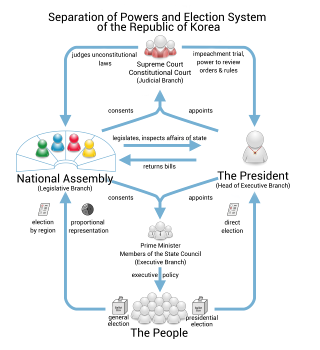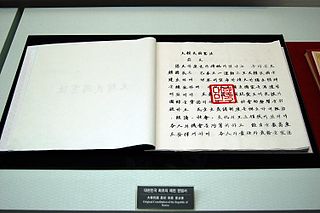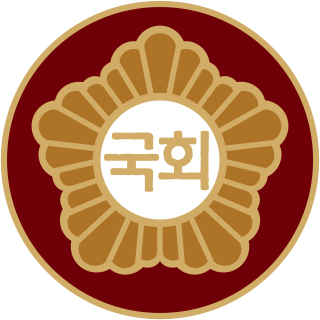Related Research Articles

The politics of South Korea take place in the framework of a presidential representative democratic republic, whereby the president is the head of state, and of a multi-party system. To ensure a separation of powers, the Republic of Korea Government is made up of three branches: legislative, executive, and judicial. The government exercises executive power and legislative power is vested in both the government and the National Assembly. The judiciary is independent of the executive and the legislature and comprises a Supreme Court, appellate courts, and a Constitutional Court.

A veto is a legal power to unilaterally stop an official action. In the most typical case, a president or monarch vetoes a bill to stop it from becoming law. In many countries, veto powers are established in the country's constitution. Veto powers are also found at other levels of government, such as in state, provincial or local government, and in international bodies.

The president of the Republic of Korea, also known as the president of South Korea (Korean: 대통령), is the head of state and head of government of the Republic of Korea. The president leads the State Council, and is the chief of the executive branch of the national government as well as the commander-in-chief of the Republic of Korea Armed Forces.
A capital city or just capital is the municipality holding primary status in a country, state, province, department, or other subnational division, usually as its seat of the government. A capital is typically a city that physically encompasses the government's offices and meeting places; the status as capital is often designated by its law or constitution. In some jurisdictions, including several countries, different branches of government are in different settlements, sometimes meaning multiple official capitals. In some cases, a distinction is made between the official (constitutional) capital and the seat of government, which is in another place.
The seat of government is "the building, complex of buildings or the city from which a government exercises its authority".

South Chungcheong Province, also known as Chungnam, is a province of South Korea in the Hoseo region in the southwest of the Korean Peninsula. South Chungcheong borders the provinces of Gyeonggi to the north, North Chungcheong, Sejong Special Self-governing City, and Daejeon Metropolitan City to the east, and North Jeolla to the south.

Gongju is a city in South Chungcheong province, South Korea.

A constitutional court is a high court that deals primarily with constitutional law. Its main authority is to rule on whether laws that are challenged are in fact unconstitutional, i.e. whether they conflict with constitutionally established rules, rights, and freedoms, among other things.

The history of Seoul can be traced back as far as 18 BC, although humans have occupied the area now known as Seoul since the Paleolithic Age. It has been the capital of numerous kingdoms on the Korean Peninsula since it was established.

The Constitution of the Republic of Korea is the supreme law of South Korea. It was promulgated on July 17, 1948, and last revised on October 29, 1987.

The Government of South Korea is the national government of the Republic of Korea, created by the Constitution of South Korea as the executive, legislative and judicial authority of the republic. The president acts as the head of state and is the highest figure of executive authority in the country, followed by the prime minister and government ministers in decreasing order.

The Constitutional Court of Korea is one of the highest courts—along with the Supreme Court—in South Korea's judiciary that exercises constitutional review, seated in Jongno, Seoul. The South Korean Constitution vests judicial power in courts composed of judges, which establishes the ordinary-court system, but also separates an independent constitutional court and grants it exclusive jurisdiction over matters of constitutionality. Specifically, Chapter VI Article 111(1) of the South Korean Constitution specifies the following cases to be exclusively reviewed by the Constitutional Court:
- The constitutionality of a law upon the request of the courts;
- Impeachment;
- Dissolution of a political party;
- Competence disputes between State agencies, between State agencies and local governments, and between local governments; and
- Constitutional complaints as prescribed by [the Constitutional Court] Act.

The Supreme Court of Korea is the highest ordinary court in the judicial branch of South Korea, seated in Seocho, Seoul. Established under Chapter 5 of the Constitution of South Korea, the Court has ultimate and comprehensive jurisdiction over all cases except those cases falling under the jurisdiction of the Constitutional Court of Korea. It consists of fourteen Justices, including the Chief Justice of the Supreme Court of Korea. The Supreme Court is at the top of the hierarchy of all ordinary courts in South Korea, and traditionally represented the conventional judiciary of South Korea. The Supreme Court has equivalent status as one of the two highest courts in South Korea. The other is the Constitutional Court of Korea.

Sejong or Sejong City, officially the Sejong Special Self-Governing City, is a special self-governing city and the de facto administrative capital of South Korea.
Capital punishment is a legal penalty in South Korea. As of December 2012, there were at least 60 people in South Korea on death row. The method of execution is hanging.

The Youth Protection Revision Act, commonly known as the Shutdown Law or Cinderella Law, was an act of the South Korean National Assembly which forbade children under the age of sixteen to play online video games between the hours of 00:00 and 06:00. The legislature passed the law on 19 May 2011 and it went into effect on 20 November 2011. The law was abolished in August 2021.

The impeachment of Park Geun-hye, President of South Korea, was the culmination of a political scandal involving interventions to the presidency from her aide, Choi Soon-sil. The impeachment vote took place on 9 December 2016, with 234 members of the 300-member National Assembly voting in favour of the impeachment and temporary suspension of Park Geun-hye's presidential powers and duties. This exceeded the required two-thirds threshold in the National Assembly and, although the vote was by secret ballot, the results indicated that more than half of the 128 lawmakers in Park's party Saenuri had supported her impeachment. Thus, Hwang Kyo-ahn, then Prime Minister of South Korea, became Acting President while the Constitutional Court of Korea was due to determine whether to accept the impeachment. The court upheld the impeachment in a unanimous 8–0 decision on 10 March 2017, removing Park from office. The regularly scheduled presidential election was advanced to 9 May 2017, and Moon Jae-in, former leader of the Democratic Party, was elected as Park's permanent successor.
The Republic of Korea has no officially recognized South Korean order of precedence, yet the Office of the President(EOP) once officially declared order of precedence among the chiefs of 6 highest constitutional institutions in year 2006 as following:
- the President of the Republic of Korea, as both head of state and leader of government
- the Speaker of the National Assembly, as leader of legislature
- the Chief Justice of the Supreme Court and the President of the Constitutional Court, as co-leader of the judiciary
- the Prime Minister, as deputy leader of government
- the Chair of the National Election Committee, as leader of constitutionally independent agency for national election administration

The judiciary of South Korea is the judicial branch of South Korean central government, established by Chapter 5 and 6 of the Constitution of South Korea.

The President of the Constitutional Court of Korea is the Chief Justice of the Constitutional Court of Korea. As presiding judge of Full bench composed of nine Justices, the President represents the Constitutional Court of Korea.
References
- ↑ "16-2(B) KCCR 1, 2004Hun-Ma554, 566(consolidated), October 21, 2004". Constitutional Court of Korea. Retrieved 2022-05-19.